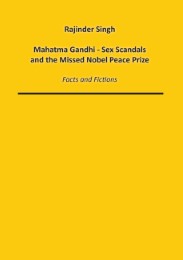Mahatma Gandhi - Sex Scandals and the Missed Nobel Peace Prize von Rajinder Singh
Mahatma Gandhi - Sex Scandals and the Missed Nobel Peace Prize
Facts and Fictions, Wissenschaftsgeschichte, Berichte aus der Geschichtswissenschaft
ISBN/EAN: 9783844033649
Sprache: Englisch
Umfang: 196 S.
Einband: kartoniertes Buch
Erschienen am
11.02.2015
Auf Wunschliste
An apostle of non-violent struggle and the icon in world history, Mohandas Gandhi alias Mohandas Karamchand Gandhi alias Sergeant Major M. Gandhi (popularly known as Mahatma Gandhi) is a disputed personality. In some circles, he is seen as the man who fought for the rights of downtrodden such as blacks and the untouchables. He is praised by Christian Missionaries, Dalai Lama, Martin Luther King and Nelson Mandela. Evidence reveals that a stark contrast to these opinions. For M. Gandhi the natives of South Africa "are as a rule uncivilised -. They are troublesome, very dirty and live almost like animals." He slept with naked women to perform sexual-experiments. For him it would have been a great victory for Jews if they ".should have offered themselves to the butcher's (Adolf Hitler) knife. They should have thrown themselves into the sea from cliffs." M. Gandhi in an article suggested the Briton: "You will invite Herr Hitler and Signor Mussolini to take what they want of the countries you call your possessions. If they do not give you free passage out, you will allow yourself, man, woman and child, to be slaughtered, but you will refuse to owe allegiance to them." Between 1924 and 1948, in nearly 100 nominations (individual or joint) he was proposed for the Nobel Peace Prize. Despite international support, why was Gandhi not a recipient of the Nobel Prize? Was it the fault of the Nobel Committee? Perhaps his Associates made mistakes? Or was Gandhi himself responsible? In order to answer such questions, the nomination letters, newspaper cuttings, Reports of the Experts' of the Nobel Committee, Confidential Record of the Committee, and other unpublished documents were obtained from the Archive of the Peace Prize Institute. The results of their analysis are given.






